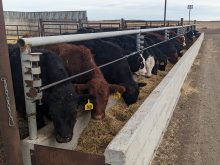It’s hard to fathom what kind of nasty incident in Canada would draw hundreds of thousands of citizens to hold massive vigils, repeatedly riot in city streets and prompt the entire federal cabinet to tender its resignation.
Let’s hope we never find out.
In South Korea, that is exactly what happened and it involves an issue we’ve more or less already dealt with in Canada: the safety of beef as it relates to BSE.
Protests in South Korea began in April, shortly after new president Lee Myung-bak agreed, as part of a free trade deal with the United States, to accept U.S. beef from cattle of all ages.
Read Also

Topsy-turvy precipitation this year challenges crop predictions
Rainfall can vary dramatically over a short distance. Precipitation maps can’t catch all the deviations, but they do provide a broad perspective.
High school students and housewives began a massive e-mail and internet protest that eventually, through hyperactive on-line users and a public appetite to quickly embrace causes, spread to more than one million people.
The mass hysteria has grown to the point where some protest organizers have suggested that re-starting U.S. beef exports, as reported in Britain’s Times Online, is “tantamount to a death sentence on young Koreans.”
It’s a bizarre reaction considering the U.S. has found only three cases of BSE and no one in North America has ever contracted the related fatal brain disease from ingesting BSE infected North American beef.
Chalk it up to the speed of information and the even faster speed of misinformation. Add concerns about food safety and voila! A national protest that has forced president Lee to attempt renegotiation of its trade deal with the U.S. to accept only beef from cattle younger than 30 months.
Politics in both countries might prevent that from happening. In South Korea, the government’s vulnerability on the beef issue has opened the door to protests on other matters. And the U.S. will be loath to change a deal to increase beef exports for its powerful cattle lobby.
South Korea used to be America’s third largest beef market and the country is anxious to regain that market, as is Canada.
In South Korea, home-grown beef costs about $100 per kilogram, a cost beyond the means of many citizens. American beef costs half that, but health concerns trump all, as indeed they would anywhere.
If South Korean acceptance of U.S. beef is an issue, Canadian beef is destined for a similar backlash. We have the same BSE risk rating as the U.S. and Canada has had more reported cases.
Canada is ahead of the U.S. with its enhanced feed ban and age verification program so it can meet beef age requirements, but it’s not going to be an easy market re-entry. Beef producers are going to need all the help they can get.














